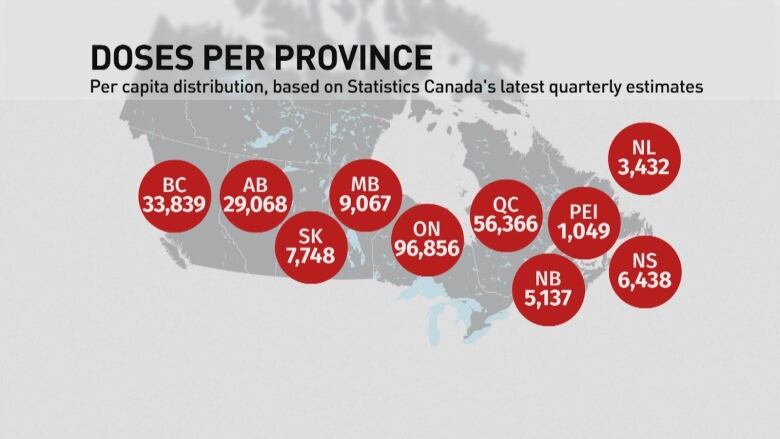What Canadians can expect now that Pfizer-BioNTech COVID-19 vaccine has been approved
The largest vaccine mobilization in the country's history is set to begin

Now that Health Canada has approved the Pfizer-BioNTechCOVID-19 vaccine, the largest vaccine mobilization in Canada's history will begin.
CBCexplains what will happen next:
When will Canadians start to bevaccinated?
It's possible that by mid-weeknext week, some Canadians could be receivingthe first COVID-19 vaccinations, officials say.
How many people will be vaccinated initially?
Prime MinisterJustin Trudeau announced on Dec. 7that up to 249,000 doses of the two-dose Pfizer-BioNTechvaccine will be ready before the end of the year following approval from Health Canada. That means about 125,000 people will be vaccinated. However,over the first few months during the first stage of the rollout, officials estimate that aboutthree million Canadians could be inoculated.
The vaccines will be distributed to jurisdictions on a per-capita basis, soeach provincewill receivevaccine dosesin numbersproportionateto their share of the population.
Where will the vaccine be sent?
Pfizer-BioNTechwill begin sending thevaccine to 14 distribution centres in large urban areas across the country that have been chosen by the provinces. Theyshould receive the doses by next week.
WATCH | Trudeau says first vaccines expected to arrive by year's end:
These centres will be equipped with an ultra-low temperature freezer, as the vaccine must be kept frozen between 80 C and 60 C.The company has developed special thermal shipping boxes that can carry the doses, packed on dry ice, for up to 10 days.
There are two delivery sites in each of Ontario, Quebec, British Columbia and Alberta, and one in each of the other six provinces. Because of logistical challenges, none of the early shipments are headed for the territories because they don't havethe capacity to safely store the Pfizer vaccine.
They have indicated a preference for the Modernavaccine, when approved, because the cold storage requirements aren't as onerous as those for the Pfizer-BioNTech vaccine, with a freezer temperature of 20 C.
Although few details about the vaccine distributionsites have been provided, Maj.-Gen.Dany Fortin,who is heading up vaccine logistics and operations, said the sites were chosen basedon conditions laid out by Pfizer and thatsome of thesites will be in hospitals.

"We're also taking into account that there will be enough competent medical professionals to carry out everything that needs to be done from the moment the vaccine is received in the thermal box, the handling of the doses, up to the administration of the vaccine," he said at a recent news conference.
Meanwhile, the provinces have chosen additional distribution sites that will be activated overthe coming days and weeks, Fortinsaid.
This Friday, arehearsal with more than 100participants from federal, provincial, territorial governments, Indigenous and industry partners and key stakeholders will be conducted soeach organizationand entity can understand their role in the vaccine distribution process, he said.
What's the timeline between distribution and vaccination?
Fortin said it will be very quick, about one or two days between defrostingthe vaccination and preparing it
"Once you receive the product, you have to unpack, thaw, decant, mix. So that is a relatively fast process for the health professionals," he said.
Who will be the first people to be vaccinated?
Provincial governments decide who gets the vaccine, but they're expected to follow the recommendations put forth by the National Advisory Committee on Immunization.
It has said priority should be given to at-risk populations, includingresidents and workers in long-term care homes, front-line health workers, people over the age of 80 and adults living in Indigenous communities.
Where will they get vaccinated?
Pfizer is recommending thatthe vaccine be administered at the first vaccination points during theinitial stages of vaccination. That means,in Canada's case, that the shots would be given at the 14 distribution sites. Health officials have been told by Pfizer that too much movement of the vaccine can lead to deterioration.
This would also mean that most residents of long-term care facilitiesmay not be able to get the initial doses and that personal care workers, health-care workers and essential visitors might get the vaccinations instead.
WATCH |Maj.-Gen. Fortin says simulation tests will be held at vaccine distribution sites:
"Moving forward as we learn more about the vaccine and ability to transport it, frozen, unfrozen and so on, we'll be able to explore other options, and more points of use will be added," Fortin said.
Will people be monitored after receiving the vaccine?
Yes. Canada's chief public health officer, Dr. Theresa Tam, said the provinces or local administrators of the vaccine must record who getsvaccinatedand also ensure a way of recalling themfor the second dose. She said there will also be monitoring of anypotentialside effects or adverse reactions to the vaccine.
Are other vaccines in the works?
Yes. Health Canada is currently reviewing applications from other companies, including Massachusetts-based Moderna, which isexpected to be the next in line to have its vaccine approved in Canada. With supply expected to ramp up, Dr. Howard Njoo,Canada's deputy chief public health officer, has said he believes most Canadians could be vaccinated against COVID-19 by the end of next year.
With files from The Canadian Press and John Paul Tasker















_(720p).jpg)


 OFFICIAL HD MUSIC VIDEO.jpg)
.jpg)



























































































